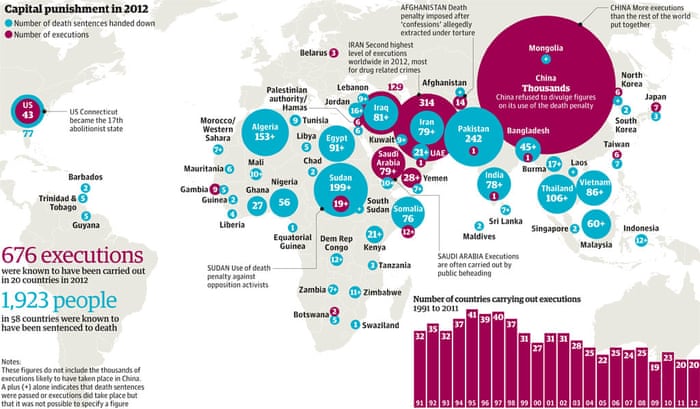The Incomparable Iran
China again carried out more executions than the rest of the world put together. Amnesty International believes thousands are executed and sentenced to death there every year, but with numbers kept a state secret the true figure is impossible to determine.
The other countries making up the world’s top five executioners in 2014 were Iran (289 officially announced and at least 454 more that were not acknowledged by the authorities), Saudi Arabia (at least 90), Iraq (at least 61) and the USA (35).
Excluding China, at least 607 executions were known to have been carried out in 2014, compared to 778 in 2013, a drop of more than 20 per cent.
Amnesty International March 2015 report on 2014 International death sentences and executions
In September of 2013 Dr. Omid Kokabee, 33, an Iranian experimental laser physicist, was awarded the Andrei Sakharov Prize, as recognition from the American Physical Society for "his courage in refusing to use his physics knowledge to work on projects that he deemed harmful to humanity, in the face of extreme physical and psychological pressure."

File Despite
his numerous, potentially serious health issues, he has not been
granted even one day of medical furlough in more than three-and-a-half
years, even though he is theoretically entitled to it.
Recognition of the man's fearless courage came also from the American Association for the Advancement of Science, which awarded Dr. Kokabee its 2014 Scientific Freedom and Responsibility Award "for his courageous stand and willingness to endure imprisonment rather than violate his moral stance that his scientific expertise not be used for destructive purposes and for his efforts to provide hope and education to fellow prisoners".
That homage is significant, from the international community. Dr. Kokabee has an international reputation, though he is a young man. He attended university in his native Iran, in Spain and in the United States, beginning his second PhD at the University of Texas at Austin, in 2010. A year later he interrupted his academic career to return to Iran for a family visit.
And that was his undoing. He was arrested by Iranian authorities. And he has languished in Tehran's Evin Prison since 2011, sentenced to a decade in prison after a conviction on the damning charges [to the Iranian regime] of "communicating with a hostile government" [the United States], and receiving "illegitimate funds".
His detention has been one of utter misery in human rights abuses that include solitary confinement, prolonged interrogations, and pressure to commit to a 'confession'. A Revolutionary Court presented no evidence, and Dr. Kokabee repeatedly stated his innocence; persecuted for refusing to assent to Iranian military insistence that he work on military projects related to Iran's nuclear aspirations.
Thanks to the conditions of his incarceration Dr. Kokabee is suffering from heart palpitations, shortness of breath and chest pains, but medical treatment has been denied him. His medical history of kidney problems place him in severe pain. His family has a history of stomach cancer; a biopsy is indicated to ensure he isn't suffering from stomach cancer.
In January 2015, his sentence was re-affirmed by a Revolutionary Court. His story of charges by government agencies and imprisonment, to suffer harsh, demeaning and life-threatening conditions is a common enough one. Saeed Malekpour, a permanent resident of Canada, a software engineer, left his home in Richmond Hill, Ontario in 2008 for a visit with his seriously ill father.
He was preparing to begin graduate studies at the University of Victoria, when he left for Iran. He has never been permitted to return to Canada. He was arrested during that 2008 visit and charged with blasphemy, accused of developing software subsequently used by a pornography network. He was tortured both physically and psychologically.
He spent almost a year in solitary confinement, and was given no medical attention after being whipped with cables, paralyzed with electrical shocks. The torture was sufficiently effective to result in a forced confession. And that confession gave Iranian authorities the 'evidence' they required to sentence Mr. Malekpour to death.
Pressure from the international community succeeded in persuading the Iranian regime to commute the death sentence, and it was transformed to life imprisonment. Stories of brutally unjust treatment meted out by the Islamic Republic of Iran to those whom it torments are legion. They make the news in particular during Iran Accountability week, where the international community focuses on Iranian human rights abuses.

Parliamentarians around the world advocate on behalf of a chosen Iranian political prisoner under the Iranian Political Prisoner Advocacy Program, in addressing conditions in a country that represents a threat to the larger community through its aspirations to achieve nuclear bombs, its support for terrorism, its incitement to violent, criminal action, and its violation of human rights, starting but not ending with the fact that the regime leads the world [after China] in state executions.

Labels: Human Rights, Iran, Nuclear Technology, Terrorism

<< Home